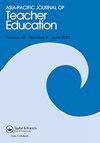The contribution of research units to research culture in Israeli teacher education colleges from unit members’ perspective
IF 1.6
3区 教育学
Q2 EDUCATION & EDUCATIONAL RESEARCH
引用次数: 1
Abstract
ABSTRACT In recent decades, Israeli teacher education colleges underwent an academisation reform, and teacher educators were required to show research productivity. Teacher education colleges formed research units in order to nurture a culture of research and help teacher educators become research active. The current study analyses research unit members’ narratives to learn about their activities, the challenges they faced, and how dealing with these challenges contributed to their colleges’ research culture. The data consist of stories they told about meaningful experiences they had while working in these units. We found that research unit members had to negotiate their status in relation to veteran teachers on the one hand, and college authorities on the other hand. Over the years, the developing research capacity of teacher educators prompted the expansion of the units and the services they provide. College authorities were a major driving force in this process, whereas research universities set the benchmark for the desired academic level. Nonetheless, the expansion of research in the teacher education colleges is inspired by a neo-liberal, individualistic approach and sometimes comes at the expense of teaching. College authorities’ leadership is needed to foster collective research agendas that are inspired by teacher education practice.从单位成员的角度看以色列师范院校研究单位对研究文化的贡献
近几十年来,以色列教师教育学院经历了一场学术改革,教师教育工作者被要求表现出研究生产力。师范院校成立研究单位,是为了培育研究文化,帮助教师教育工作者成为研究能手。目前的研究分析了研究单位成员的叙述,以了解他们的活动,他们面临的挑战,以及如何应对这些挑战对他们所在大学的研究文化做出贡献。这些数据包括他们讲述在这些单位工作时有意义的经历的故事。我们发现,研究单位成员必须一方面与老教师谈判,另一方面与大学当局谈判。多年来,教师教育研究能力的发展促进了单位的扩大和服务的提供。大学当局是这一过程的主要推动力,而研究型大学则为理想的学术水平设定基准。然而,教师教育学院的研究扩张受到新自由主义、个人主义方法的启发,有时是以牺牲教学为代价的。需要大学当局的领导来促进受教师教育实践启发的集体研究议程。
本文章由计算机程序翻译,如有差异,请以英文原文为准。
求助全文
约1分钟内获得全文
求助全文
来源期刊

Asia-Pacific Journal of Teacher Education
EDUCATION & EDUCATIONAL RESEARCH-
CiteScore
4.40
自引率
7.70%
发文量
29
期刊介绍:
This journal promotes rigorous research that makes a significant contribution to advancing knowledge in teacher education across early childhood, primary, secondary, vocational education and training, and higher education. The journal editors invite for peer review theoretically informed papers - including, but not limited to, empirically grounded research - which focus on significant issues relevant to an international audience in regards to: Teacher education (including initial teacher education and ongoing professional education) of teachers internationally; The cultural, economic, political, social and/or technological dimensions and contexts of teacher education; Change, stability, reform and resistance in (and relating to) teacher education; Improving the quality and impact of research in teacher education.
 求助内容:
求助内容: 应助结果提醒方式:
应助结果提醒方式:


